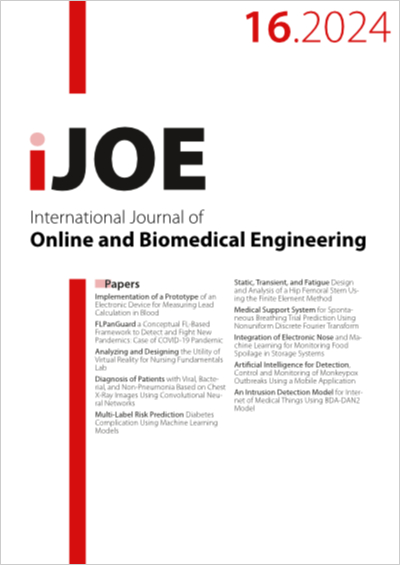Multi-Label Risk Prediction Diabetes Complication Using Machine Learning Models
DOI:
https://doi.org/10.3991/ijoe.v20i16.51643Keywords:
Multi-Label Classification, Risk Prediction Models, Diabetes Complication, Machine Learning, Early DiagnosisAbstract
Early diagnosis of diabetic complications based on risk factors is essential but remains understudied, particularly in the context of multi-label classification (MLC). This study leverages data from the behavioral risk factor surveillance system (BRFSS) from 2016 to 2021 to classify seven diabetes complications using MLC techniques combined with multiple machine learning (ML) models. We analyzed 33 variables per dataset year after thorough statistical analysis and preprocessing. Seven ML models were employed: Artificial neural network (ANN), random forest (RF), decision tree (DT), K-nearest neighbors (K-NN), naïve Bayes (NB), support vector machine (SVM), and deep neural network (DNN). We compared two MLC frameworks: problem transformation and algorithm adaptation. The performance of the models was evaluated using several metrics, and feature importance for each complication was analyzed. Our results indicate that the algorithm adaptation framework, particularly with DNN models, outperforms problem transformation. This highlights the potential of this approach for improving classification performance in complex diseases with multiple complications.
Downloads
Published
How to Cite
Issue
Section
License
Copyright (c) 2024 Nur Rachman Dzakiyullah, S.Kom., M.Sc., Ph.D, Prof. Ts. Dr. Burhanuddin Mohd. Aboobaider, Ts. Dr. Raja Rina binti Raja Ikram, Dr.Eng. Novanto Yudistira, S.Kom., M.Sc., Muhammad Rifqi Fauzi, S.Kom, Dr. Ir. Dwijoko Purbohadi, M.T.

This work is licensed under a Creative Commons Attribution 4.0 International License.



